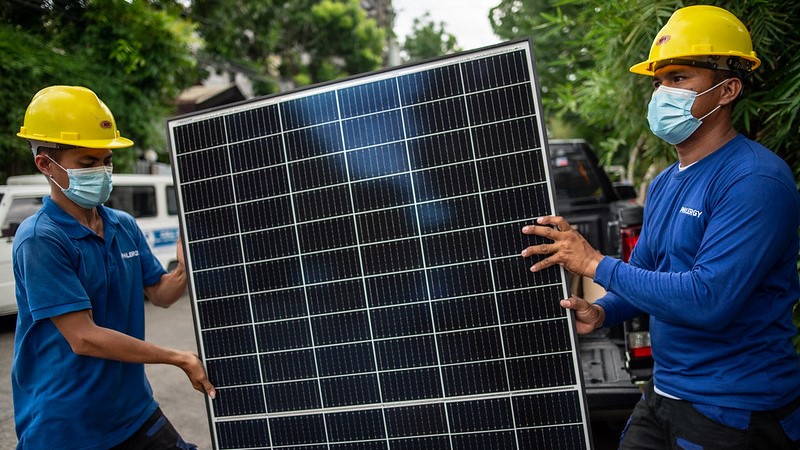Update: We are no longer receiving pitches.
Climate Home News is seeking stories on the global renewable energy supply chain.
The rapid deployment of renewable energy is critical for the world to meet its climate goals. This requires a massive expansion of the renewable energy supply chain, from the critical minerals required to manufacture solar panels, wind turbines, and batteries to the skills and jobs needed to produce, assemble, and install them.
Yet, large parts of this supply chain are concentrated in a few countries (including China) and dominated by a handful of companies. This rapidly-growing industry has at times pitted the clean energy transition against human rights and other environmental impacts, and sparked conflicts over land and water resources.
Delivering a fast and fair energy transition means avoiding the pitfalls of the extractive fossil-fuel economy. Responsible extraction and production, and centering local communities and workers’ rights could spur sustainable development and create good jobs.
What we are looking for
Our ‘Clean Energy Frontiers’ series aims to produce hard-hitting accountability journalism on the changing-landscape of the renewable energy supply chain.
Stories should spotlight bottlenecks, scrutinise key actors, and expose environmental impacts, and human and labour rights violations. We are also looking for stories robustly examining solutions to these challenges, including through innovation.
This could include examining the plans of emerging transition mineral producers, exposing working conditions in manufacturing processes, investigating the relationship between coal power and clean technology production, and assessing early efforts to address waste.
We plan to publish six deeply reported articles by June 2024. We are seeking stories from around the world and we encourage journalists from developing countries to send us their ideas.
The ideal story will capture the attention of our international audience by providing an original angle, highlight (geo)political tensions or controversy, and combine on-the-ground reporting (when appropriate) with investigative journalism techniques.
Stories should include visual elements (such as satellite images, high-quality photos and videos) and we encourage partnerships between journalists and photographers. A graphic designer is working with us to support the creation of graphics and illustrations.
How to pitch
If you are a journalist with at least three years’ experience, please send us your pitches. You must have fluent spoken and written English. Journalists from all countries are welcome to apply. It helps if you have worked with international media before and have awareness of climate change issues.
Your pitch should include:
- The top line of the story and essential context in no more than 200 words. If we like the idea, we will ask for more detail
- The sources you would interview
- Any travel requirements
- A short summary of your journalism experience, including links to three recent stories you are proud of.
We can offer a reporting fee of around $1,600 per story, including photos and videos, in addition to covering travel and accommodation expenses. Travel costs will be negotiated in advance and reimbursed subject to valid receipts.
Please send your pitches with the word ‘Pitch’ in the subject line to project editor Chloé Farand by emailing [email protected]. We will commission the first three stories by late October and continue to review pitches until February 2024 for publication by June next year.
